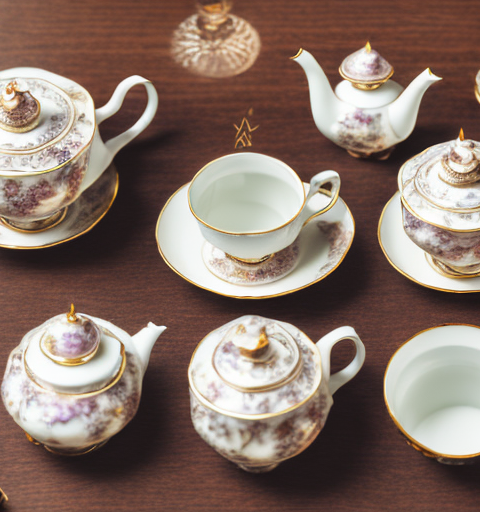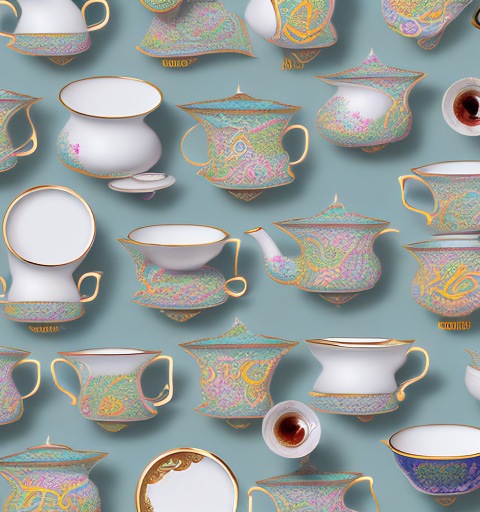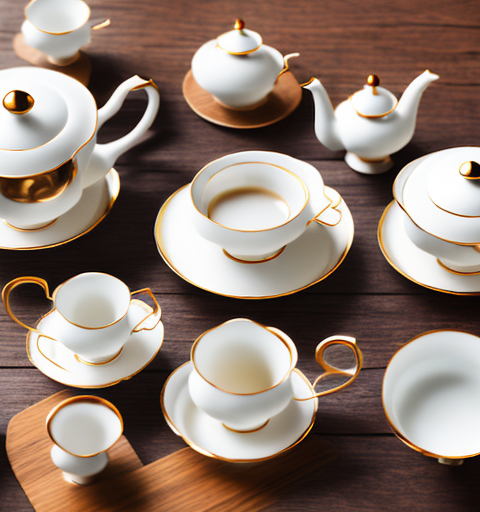Looking for the perfect gift for your loved ones? Look no further than matcha green tea sets. These elegant and thoughtful gifts are not only visually appealing but also offer a unique and enjoyable experience for tea enthusiasts. In this article, we will explore the art of matcha tea, the components of a matcha green tea set, how to choose the perfect set, the health benefits of matcha green tea, and how to prepare this delicious beverage. We will also discuss the joy of gifting a matcha green tea set and how to personalize it for that extra special touch. So grab a cup of tea and let’s dive into the world of matcha!
Understanding the Art of Matcha Tea
H3: The History of Matcha Tea
Matcha tea has a rich history that dates back thousands of years. It originated in China during the Tang Dynasty and was later introduced to Japan by Zen Buddhist monks. These monks recognized the unique qualities of matcha tea and its ability to enhance meditation and promote a sense of calmness. As the popularity of matcha tea grew, it became an integral part of Japanese tea ceremony, known as Chanoyu.
The tea ceremony, or Chanoyu, is a ritualistic practice that emphasizes tranquility, harmony, and respect. It is a carefully choreographed performance where every movement and gesture has meaning. The preparation and serving of matcha tea during the ceremony is considered an art form in itself, requiring years of training to master.
H3: The Cultural Significance of Matcha Tea
The cultural significance of matcha tea in Japanese society cannot be overstated. It is not just a beverage but a symbol of hospitality, mindfulness, and connection to nature. The act of preparing and serving matcha tea is seen as a gesture of welcome and respect towards guests.
Matcha tea has become a timeless tradition that continues to be celebrated and cherished. It is often served in traditional tea houses or during special occasions such as weddings or religious ceremonies. The vibrant green color of matcha tea is believed to represent new beginnings and renewal, making it a popular choice for auspicious events.
Furthermore, matcha tea is deeply rooted in the concept of mindfulness. The process of preparing matcha tea requires complete focus and attention to detail. Each step, from sifting the tea powder to whisking it into a frothy consistency, is done with intention and care. This mindful approach extends to the act of drinking matcha tea, where one is encouraged to savor each sip and be fully present in the moment.
Additionally, matcha tea is closely tied to nature and the appreciation of its beauty. The tea leaves used to make matcha are shade-grown, which enhances their flavor and nutrient content. This cultivation method also gives matcha its vibrant green color, reminiscent of lush green forests and vibrant spring foliage. Drinking matcha tea is like immersing oneself in nature, providing a sense of calmness and tranquility.
Components of a Matcha Green Tea Set
H3: The Matcha Bowl: Chawan
The matcha bowl, or chawan, is an essential component of a matcha green tea set. It is a wide bowl with a flat bottom and high sides, designed to whisk the matcha tea into a smooth and frothy texture. Chawans come in various shapes, sizes, and colors, each with its own unique character.
When selecting a chawan, one must consider not only its aesthetic appeal but also its functionality. The size of the bowl can determine the amount of matcha tea prepared, with larger bowls accommodating more tea. The depth of the bowl affects the ease of whisking the tea, as a shallow bowl allows for better control and movement of the whisk.
Furthermore, the material of the chawan can influence the taste and temperature of the matcha tea. Traditional chawans are often made from ceramic or porcelain, which help to retain the heat of the tea. Some modern variations may be crafted from glass or even bamboo, offering a contemporary twist to the traditional tea set.
H3: The Bamboo Whisk: Chasen
The bamboo whisk, or chasen, is a delicate and intricate tool used to whisk the matcha powder and hot water together. Made from a single piece of bamboo, it has numerous thin tines that create the perfect frothy consistency. The chasen requires care and attention to prolong its lifespan.
Each chasen is meticulously handcrafted by skilled artisans, who carefully split the bamboo and carve the tines into shape. The number of tines can vary, ranging from 80 to 120, with some chasens having a higher density for a more vigorous whisking experience. The quality of the chasen can greatly impact the final result of the matcha tea, as a well-made whisk ensures a smooth and creamy texture.
To ensure the longevity of the chasen, it should be rinsed with warm water before and after each use. After rinsing, it is essential to store the whisk in a chasen holder or stand, allowing it to air dry naturally. This prevents the bamboo from warping or developing mold, ensuring that the chasen remains in pristine condition for future tea ceremonies.
H3: The Tea Scoop: Chashaku
The tea scoop, or chashaku, is a small bamboo spoon used to measure the right amount of matcha powder for the tea ceremony. It is meticulously crafted and serves as a symbol of precision and reverence in the tea-making process.
Traditionally, chashakus were made from a single piece of bamboo, carefully shaped and polished to create a smooth and elegant utensil. Each scoop is unique, reflecting the craftsmanship and artistry of the maker. Nowadays, chashakus may also be crafted from other materials such as wood or even metal, offering a modern twist to this traditional tool.
During the tea ceremony, the chashaku is used to measure the precise amount of matcha powder, ensuring consistency in flavor and strength. The length and shape of the scoop allow for an accurate and controlled transfer of the powder from the tea caddy to the matcha bowl. The chashaku is typically held with the thumb and index finger, symbolizing the delicate and intentional nature of the tea-making process.
H3: The Tea Caddy: Natsume
The tea caddy, or natsume, is a small container used to store matcha powder. Traditionally made from wood, it is adorned with intricate designs and patterns. The natsume not only preserves the freshness of the matcha powder but also adds a touch of elegance to the tea set.
Each natsume is a work of art, with skilled craftsmen meticulously carving and lacquering the wooden container. The intricate designs often depict natural motifs or traditional patterns, reflecting the rich cultural heritage of the tea ceremony. The lacquer not only enhances the beauty of the natsume but also protects the wood from moisture and external elements.
When storing matcha powder in the natsume, it is important to keep it in a cool and dry place, away from direct sunlight. This ensures that the matcha remains fresh and flavorful, ready to be used for future tea ceremonies. The natsume can also be used as a decorative piece, displayed alongside the other components of the matcha green tea set, adding a touch of sophistication to any tea lover’s collection.
How to Choose the Perfect Matcha Green Tea Set
Choosing the perfect matcha green tea set is an important decision for tea enthusiasts. A matcha green tea set not only enhances the tea drinking experience but also adds a touch of elegance and authenticity to the ritual. While there are many factors to consider, here are three key aspects that will help you make an informed choice.
H3: Quality of the Matcha Powder
When it comes to matcha, the quality of the powder is of utmost importance. The taste, aroma, and color of the tea largely depend on the quality of the matcha powder used. It is crucial to look for ceremonial-grade matcha, which is made from young tea leaves that have been carefully shade-grown and stone-ground into a fine powder. This meticulous process ensures that the matcha powder retains its vibrant green color and delicate flavor. A cup of matcha made from high-quality powder will have a smooth and creamy texture, with a hint of natural sweetness.
Additionally, ceremonial-grade matcha is packed with antioxidants and other beneficial compounds that contribute to its numerous health benefits. So, when choosing a matcha green tea set, pay close attention to the quality of the matcha powder included. Opting for a set that includes a tin of ceremonial-grade matcha will guarantee an exceptional tea-drinking experience.
H3: Authenticity of the Tea Set
For tea enthusiasts who appreciate the art and tradition of the Japanese tea ceremony, the authenticity of the tea set is a crucial factor to consider. A truly authentic tea set is one that is made in Japan by skilled artisans who have a deep understanding of the tea ceremony. These artisans follow traditional methods and use high-quality materials to craft each piece, ensuring an authentic and meaningful experience.
When examining a tea set for authenticity, look for certain characteristics. Traditional Japanese tea sets are often made from porcelain or ceramic, with intricate designs and patterns that reflect the rich cultural heritage of Japan. The tea bowls, known as chawan, are typically wide and shallow, allowing the matcha to be whisked properly. The tea whisk, or chasen, is made from bamboo and is meticulously crafted to create the perfect froth. The tea scoop, or chashaku, is traditionally made from bamboo or wood and is used to measure the right amount of matcha powder.
By choosing an authentic tea set, you not only ensure the highest quality craftsmanship but also immerse yourself in the centuries-old tradition of the Japanese tea ceremony.
H3: Price vs. Value
When investing in a matcha green tea set, it is natural to consider the price and the value it brings. While the price of a tea set may vary depending on factors such as material, craftsmanship, and brand, it is essential to assess the overall value it offers.
A well-crafted tea set made from high-quality materials will not only stand the test of time but also enhance your tea-drinking experience. Porcelain or ceramic tea sets are known for their durability and ability to retain heat, ensuring that your matcha stays warm for longer periods. Additionally, a tea set with intricate designs and patterns adds a touch of elegance and aesthetic appeal to your tea ceremony.
Consider the long-term benefits of investing in a high-quality tea set. While it may seem like a significant investment initially, a well-crafted tea set will last for years, providing you with countless moments of tranquility and enjoyment. The value it brings to your tea-drinking ritual cannot be understated.
In conclusion, when choosing a matcha green tea set, it is essential to consider the quality of the matcha powder, the authenticity of the tea set, and the price versus the value it offers. By paying attention to these key aspects, you can ensure that your matcha green tea set is a perfect match for your tea-drinking needs and preferences.
The Health Benefits of Matcha Green Tea
Matcha green tea has gained popularity in recent years due to its numerous health benefits. Not only does it have a unique and vibrant flavor, but it also offers a wide range of advantages for the body and mind. Let’s explore some of the key benefits of matcha green tea in more detail.
H3: High in Antioxidants
One of the most remarkable qualities of matcha green tea is its high antioxidant content. Antioxidants are essential for protecting the body against free radicals, which are unstable molecules that can cause damage to cells and contribute to various health issues. Matcha green tea is particularly rich in a type of antioxidant called catechins. These powerful compounds have been extensively studied for their potential cancer-fighting properties and overall health benefits.
Research has shown that catechins in matcha green tea may help to neutralize free radicals, reducing the risk of chronic diseases such as cancer, heart disease, and diabetes. Regular consumption of matcha green tea can provide a significant boost to your body’s natural defense system, helping you maintain optimal health and well-being.
H3: Boosts Brain Function
In addition to its antioxidant properties, matcha green tea can also enhance brain function. The tea contains a small amount of caffeine, which provides a gentle energy boost without the jitters often associated with coffee or other caffeinated beverages. This makes matcha an excellent choice for those looking to increase their alertness and productivity without experiencing the side effects of excessive caffeine consumption.
Furthermore, matcha green tea contains an amino acid called L-theanine. This unique compound has been found to promote relaxation and improve focus. When combined with caffeine, as found in matcha, L-theanine can have a synergistic effect on brain function. It helps to reduce anxiety and stress while improving mental clarity and concentration. This combination of caffeine and L-theanine makes matcha green tea an ideal choice for those seeking a natural and sustainable way to boost their cognitive abilities.
H3: Promotes Heart Health
Another significant benefit of matcha green tea is its potential to promote heart health. Studies have shown that regular consumption of matcha tea may help to lower levels of LDL cholesterol, often referred to as “bad” cholesterol. High levels of LDL cholesterol can increase the risk of heart disease and other cardiovascular problems.
The antioxidants present in matcha green tea play a crucial role in supporting cardiovascular health. They help to reduce inflammation in the body, which is a common factor in the development of heart disease. Additionally, these antioxidants have been found to improve blood flow, which can further contribute to a healthy heart.
By incorporating matcha green tea into your daily routine, you can take proactive steps to protect your heart and reduce the risk of cardiovascular issues. Its unique combination of antioxidants and other beneficial compounds makes matcha green tea a powerful ally in maintaining a healthy heart.
How to Prepare Matcha Green Tea
H3: The Traditional Japanese Way
Preparing matcha tea in the traditional Japanese way requires practice and attention to detail. Start by sifting the matcha powder into a matcha bowl to remove any lumps. Then, add hot water and whisk the mixture vigorously using a bamboo whisk until it becomes frothy. Finally, savor the moment by drinking the matcha tea in small sips, appreciating the flavors and aroma.
H3: Modern Twists on Matcha Preparation
For those looking for a modern twist on matcha preparation, there are various creative recipes to explore. From matcha lattes and smoothies to matcha-infused desserts, the possibilities are endless. Experiment with different flavors and ingredients to find your favorite matcha creation.
Gifting a Matcha Green Tea Set
H3: Occasions for Gifting Matcha Sets
A matcha green tea set makes a memorable gift for a wide range of occasions. Whether it’s a birthday, anniversary, housewarming, or holiday celebration, a matcha set is a thoughtful present that can be enjoyed by tea lovers and those new to matcha alike.
H3: How to Wrap and Present Your Gift
When presenting a matcha green tea set as a gift, presentation is key. Consider wrapping the set with beautiful, eco-friendly wrapping paper or a traditional furoshiki cloth. You can also include a handwritten note or a guide to matcha tea to enhance the overall gifting experience.
H3: Personalizing Your Matcha Gift Set
To make the matcha green tea set even more special, consider personalizing it. Add a custom engraving on the tea scoop, select a chawan with a design or color that reflects the recipient’s personality, or include additional accessories, such as a matcha whisk holder or a tea towel.
In conclusion, a matcha green tea set is a truly perfect gift for any occasion. It embodies the art of matcha tea, offers a delightful and healthy experience, and can be personalized to create a memorable and cherished gift. So why not give the gift of matcha and bring joy, tranquility, and deliciousness into the lives of your loved ones?






